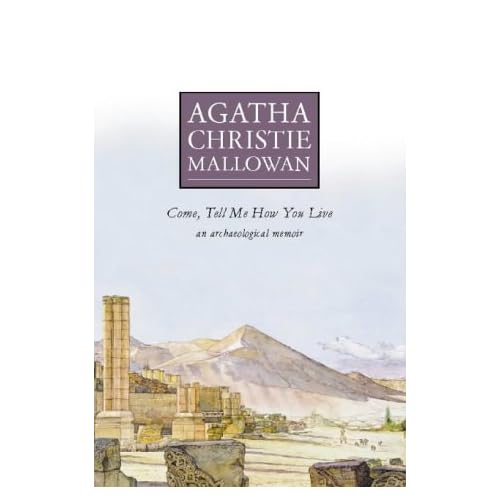My first exposure to her work was through the film version of Murder on the Orient Express, during that time in the early 90s when Malaysia's RTM2 (as it was then known) must have thought that Victorian period crime movies were the choice of the people, because they showed one or two every week. I was too young at that time and I thought it was just another boring, draggy British drama. Only later did I make the acquaintance of the real Hercule Poirot between the pages of Murder in Mesopotamia and Lord Edgeware Dies, and discover the charm in his personality that only Christie's words could have brought to life.
A couple of years ago, I was browsing in the bargain aisle of a popular bookshop in KL when I came across Agatha Christie's memoirs, Come, Tell Me How You Live.
Reading it is like being given access into her private journal. You get to see what her "everyday" was like, living on a Middle Eastern archaeological dig in the 30s. There is mention of violent inter-clan fights among the workers; the painful necessity of deciding which half of the discovered artefacts to surrender to the co-sponsors of the dig that makes my recurrent "Dark Chocolate Fantasy or Mango Sorbet?" quandary at the ice-cream store seem even more stupidly frivolous than it is;and pushing this book even higher up my personal rankings, there's even a cat. Not just any cat, but a professional cat.
Giant's Bread was the first of a series of non-crime novels that Christie wrote under the pen name of “Mary Westmacott”. It surprised me at almost every corner with how current and modern it was. If someone had told me it was a World War I period novel written in the past few years, I would have believed it.
I could tell you about the characters and the plot, but the weaving of the story is so intricate that if I do, I might compromise your enjoyment of the story. Trust me, this book is worth reading, even if you're “not the reading type”. You'll see how the trials and pains of growing up are practically universal, whether you're in pre-war England or '00s anywhere. You'll love her dry irreverence:
“The living don't all want exactly the same thing, so I don't see why the dead should either. There must be heaps of selfish dead – if they exist at all they must be very much the same as they were in life. They can't be full of beautiful and unselfish feelings all at once. It always makes me laugh when I see a bereaved widower tucking into his breakfast the day after the funeral and saying solemnly, 'Mary wouldn't wish me to grieve!' How does he know? Mary may be simply weeping and gnashing her teeth (astral teeth, of course) at seeing him going on as usual just as though she had never existed.”
I laughed at loud when I got to the parenthesis about astral teeth. I'm glad I read alone these days.
Anyway, I'm having a hard time returning this one to the library. It's like potato gratin on a draughty winter's day: once it's finished, you still want more.





